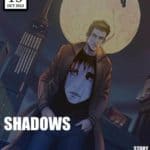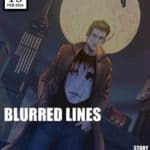Part One: Farraday Free Clinic
It’s been almost an hour and a half since he first filled out all his paperwork, and he’s waiting as patiently as he can, despite the fact that his Saturday is slowly slipping away from him. It’s another thirty-five minutes before a young nurse finally calls his name, at which point he stands up and shuffles past all the other people in the room, following the nurse into a small examination room in the clinic where he stands, just as awkwardly, looking at the examination bed with the thin paper sheet spread out on top of it.
“Do I have to get on that?” Arthur’s voice is rough and gravelly—he’s a smoker, though he’s gone without cigarettes for the entire week in anticipation of today’s exam. He wants a cigarette so badly his hands are almost shaking with desire. He grips his cap tighter, and his knuckles whiten.
“Not right now.” The nurse smiles comfortingly. She’s a pretty young thing, though he’s not sure how much of the beauty is natural and how much is applied. Her dark red hair is obviously not a natural color, and her dark blue eyes might not be natural either. His niece bought contact lenses that turned her eyes purple. Purple! Young people are always trying new things. “We just have a few more questions, then I’m going to take your blood pressure and a blood sample.”
“Do I have to…” Arthur pauses and looks away, coloring slightly. “Do I have to take my clothes off?” He hasn’t really been to see a doctor since he was in the army, and he’s not comfortable with the idea of undressing in front of someone so young.
The nurse does not smile, much to his relief. “No,” she says. “Not right now. I’m just going to take your pulse, ask you a few questions, and then take a little blood for our tests. Just take a seat right there and roll up that sleeve.”
Arthur nods, relieved. He sits in a plastic chair and rolls up his right sleeve past his elbow.
The nurse looks at the tattoo on his arm. “Thank you for your service, sir.”
Arthur colors again. “That was a long time ago.”
“Was it the Gulf War?” She places the blood pressure cuff on his arm, makes sure everything is arranged correctly, then begins to squeeze the bulb. The cuff tightens. “I had an uncle in Desert Storm.”
“Vietnam,” Arthur says. “Like I said, long time ago.”
She nods and smiles again. Her hair and eyes may be fake, but the smile is genuine. “You have thick calluses. Still working?”
“I do construction,” Arthur says, a trace of pride creeping into his voice. “I can keep up with the younger guys OK. The foreman doesn’t know how old I am. You’re not going to tell him, are you? I need the job…”
The nurse laughs warmly. “Don’t worry. All information remains confidential. I’m going to take some blood now, all right?”
Arthur nods, sighing in relief. He hardly notices as she cleans the spot over the vein and draws the blood.
“You put on your form that you can’t remember the last time you saw a doctor,” the nurse says.
“Yeah.” Arthur watches with distracted interest as the blood is drawn out of his vein and siphoned into a small vial. “Since I left the army. Never got sick enough to bother, and it was expensive. Is this visit really free?”
“Sure is.” The nurse smiles again. “That’s why we’re so busy today. Now I’m going to take this down to the lab. The doctor is still with another patient, so there may be another wait. Just make yourself comfortable. You can lie down on the examination table, if you want. The top raises a little if lying flat on your back makes you uncomfortable.”
“All right,” Arthur says. “Thanks.”
“Hopefully the doctor will be by soon,” she says. “Then you can enjoy the rest of your Saturday.” She flashes him another beautiful, genuine smile, then takes the vial and exits the room, closing the door behind her.
Arthur looks around the small room and suddenly wishes he had a muted television to watch.
The door opens and an older man in a white coat shuffles into the room. He’s a rather plain-looking man, about Arthur’s age but softer—he’s a man who is used to an entirely different type of labor. His hair is short and almost entirely gray. He wears bifocals set in thick, black plastic rims, the kind that were popular in the late 70s. The man smiles at Arthur, showing yellowed smoker’s teeth. “Hello, Mr. Franklin! Sorry for the wait. The place is hopping today, I have to say. Let’s get everything moving, there are a few things I want to go over before we send you on your way.”
The doctor’s voice is jovial, but it’s a practiced joviality that Arthur suspects comes from saying the same thing to every patient, day after day. The doctor looks down and reads, his pen rapping the clipboard tap tap tap tap tap with rapid impatience as his eyes linger on something.
Arthur sits up, the paper crinkling as he swings his legs off the side of the table. The nurse had been right—it was more comfortable with the back raised. He rubs his eyes and stifles a yawn.
“Your blood results are interesting,” the doctor begins, and suddenly Arthur is wide awake. He can’t think of a single reason why a doctor would find anything about him interesting unless it was bad. The doctor looks up and raises his eyebrows, apparently surprised by the expression on Arthur’s face, then says, “Oh, no, no, Mr. Franklin I’m sorry, I didn’t mean it that way. We didn’t find anything that would concern us.”
Arthur exhales slowly and forces himself to calm down. “I thought you were going to tell me I had cancer.” His voice is thick and husky.
“No…” The doctor peers at him critically. “But it’s obvious you smoke, Mr. Franklin, and you should probably stop.”
“Yeah.” Arthur’s voice shakes a little. “I know. It’s not easy.”
The doctor nods. “I can provide you with a list of numbers you can call. Support hotlines, a Nicotine Anonymous group. Do you have any insurance?”
Arthur shakes his head.
“Well, we can discuss your options later. Right now I’d like to talk to you about why I said your blood was interesting—interesting in a good way, not a bad way.”
“OK,” Arthur says.
The doctor smiles again, with the same forced jocularity. “This clinic, and a number of other clinics like it, is funded by a group that does a lot of cutting-edge medical research. Specifically genetic research. Are you familiar with genetics, Mr. Franklin?”
Arthur shrugs. “Just… a part of your body that gives you blue eyes or brown eyes.”
The doctor smiles again, this time a bit patronizingly. “That’s the general idea. You can tell a little bit about your genes based on some very basic blood tests—tests you agreed to when you signed our forms in the lobby. As it happens, you seem to have a genetic profile that our sponsors are very interested in, and they’d like to make you an offer.”
Arthur tries not to scowl, but he can’t hide the suspicion in his eyes. “Genetic what? I don’t want to sell my organs.”
The doctor laughs as if Arthur told the funniest joke he’d ever heard. “Lord! No, I daresay you wouldn’t! A ‘genetic profile’ is just a specific combination of genes. It’s like only being interested in people with green eyes and red hair, only the specific things they’re looking for are inside the body, not on the outside. They just want you to agree to donate some blood once a month for their studies.”
Arthur frowns. “They just want blood?”
“That’s right,” the doctor says. “And a very small amount—it’s not like giving blood at the Red Cross. They want a much, much smaller sample than that.”
“And what do I get?” Arthur asks. “I mean, do they pay me?”
“Oh yes,” the doctor says. “Quite well, actually. They’re a very large company, and this genetic combination is very rare. You’ll have to sign a paper promising not to talk to anyone about it, and show up once a month for your bloodwork. In return, you’ll be paid quite well each month, and you’ll also be signed up for a very comprehensive lifetime health insurance plan.”
Arthur’s frown deepens. “No offense, but that sounds too good.”
The doctor nods. “It’s a common reaction, especially in Farraday City. If you like I can put you in touch with some other people in the program. TriHealth—that’s the insurance company sponsoring the research and providing the insurance—keeps a list of people who have volunteered to talk to new prospective volunteers.”
Arthur tries to look over the top of the clipboard to see what’s written on it, but the doctor raises it slightly, obscuring the text. “They want to pay me for looking at my blood?”
The doctor nods. “And health insurance.”
“Pay how much?” Arthur asks.
The doctor tells him.
Twenty minutes later Arthur is filling out more forms. There will be more tests later today, and he’ll have to return to the clinic next week for his first official donation, but suddenly he doesn’t mind that so much of his Saturday has been spent sitting around waiting. He’s going to make more money from this research than he ever did working construction. He’s about to be able to retire. He’s going to have more free time than he ever dreamed possible.
For Arthur Franklin, things are finally looking up.


